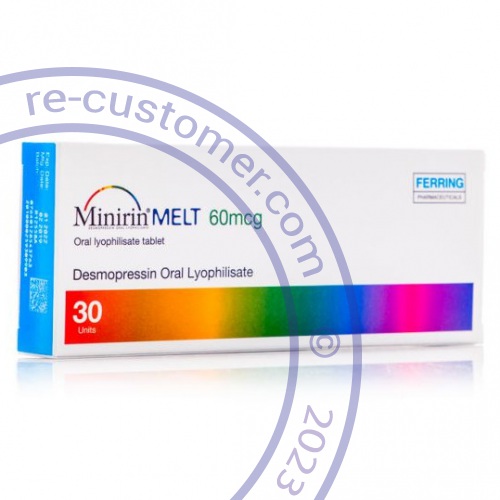- Trusted Tablets
- Diabetes
- Nocdurna

Brand(s): Minirin
Manufacturer: Ferring Pharmaceuticals Pvt Ltd
Disease(s): Bed-wetting / Central Cranial Diabetes Insipidus / Increased Thirst / Increased Urination Caused By Head Surgery Or Head Trauma
| Package | Price | Per sublingual tablet | Savings | Order |
|---|---|---|---|---|
| 60mcg × 180 sublingual tablets | $ 647.95 | $ 3.60 | $ 161.75 | Add to cart |
| Free AirMail shipping | ||||
| 60mcg × 120 sublingual tablets | $ 449.95 | $ 3.75 | $ 89.85 | Add to cart |
| Free AirMail shipping | ||||
| 60mcg × 90 sublingual tablets | $ 350.95 | $ 3.90 | $ 53.90 | Add to cart |
| Free AirMail shipping | ||||
| 60mcg × 60 sublingual tablets | $ 245.95 | $ 4.10 | $ 23.95 | Add to cart |
| Free AirMail shipping | ||||
| 60mcg × 30 sublingual tablets | $ 134.95 | $ 4.50 | Add to cart | |
Desmopressin sublingual pills
What is desmopressin?
Desmopressin is used to treat nighttime bed-wetting, central diabetes insipidus, and increased thirst and urination caused by head surgery or head trauma.
Desmopressin is a man-made form of a hormone that occurs naturally in the pituitary gland and regulates how the body uses water.
Desmopressin may also be used for purposes not listed in this medication guide.
Warnings
You should not use desmopressin if you have severe kidney disease or hyponatremia (low sodium levels in your body). You also should not take Nocdurna if you have severe thirst, uncontrolled hypertension, heart failure, high levels of a hormone that causes fluid retention, or if you take a diuretic or use steroid medication.
Limit your intake of water and other fluids while you are using desmopressin. Drinking too much water may lead to a serious, life-threatening electrolyte imbalance.
Call your doctor right away if you have signs of low sodium: headache, confusion, muscle cramps, severe weakness, vomiting, loss of coordination, and feeling restless or unsteady.
Before taking this medicine
You should not use desmopressin if you are allergic to it, or if you have:
- severe kidney disease; or
- hyponatremia (low sodium levels in your body).
- You also should not take Nocdurna sublingual desmopressin if you have:
- a disease or psychologic disorder that causes extreme or unusual thirst;
- syndrome of inappropriate antidiuretic hormone secretion (SIADH, high levels of a hormone that causes fluid retention);
- severe or uncontrolled high blood pressure;
- heart failure; or
if you take a diuretic ("water pill") or use a steroid medicine (oral, nasal, inhaled, or injectable).
Desmopressin is not approved to treat bed-wetting in a child younger than 6 years old. Nocdurna is not approved for use in anyone younger than 18 years old.
Do not give desmopressin to a child for any reason without medical advice.
Tell your doctor if you have ever had:
- an electrolyte imbalance;
- unusual thirst;
- fluid retention;
- congestive heart failure, coronary artery disease;
- high blood pressure;
- urination problems;
- kidney disease; or
- cystic fibrosis.
How should I take desmopressin?
Your doctor may perform blood tests to make sure you do not have conditions that would prevent you from safely using desmopressin.
Follow all directions on your prescription label and read all medication guides or instruction sheets. Use the medicine exactly as directed.
Limit your intake of water and other fluids while you are using desmopressin. Drinking too much water may lead to a serious, life-threatening electrolyte imbalance.
Fluid restriction is especially important in children and older adults using desmopressin. Follow your doctor's instructions about the type and amount of liquids you should drink.
If you were switched from desmopressin nasal spray to desmopressin tablets, wait at least 12 hours after your last nasal dose before you take your first tablet.
Take the sublingual tablet 1 hour before bedtime. Place the tablet under your tongue and allow it to dissolve. Empty your bladder before going to bed.
Your blood pressure will need to be checked often and you may need frequent blood tests.
Store at room temperature away from moisture, light, and heat.
What should I avoid while taking desmopressin?
While treating nighttime bed-wetting, avoid drinking anything within 1 hour before your bedtime dose of desmopressin. Do not drink anything until the next morning, or at least 8 hours after you have taken the medicine.
Avoid coffee, tea, cola, energy drinks, or other sources of caffeine before bedtime.
Also avoid drinking alcohol before bedtime.
Desmopressin side effects
Get emergency medical help if you have signs of an allergic reaction: hives; difficult breathing; swelling of your face, lips, tongue, or throat.
Call your doctor at once if you have:
- low levels of sodium in the body--headache, confusion, hallucinations, muscle cramps, severe weakness, vomiting, loss of coordination, feeling restless or unsteady;
- flushing (sudden warmth, redness, or tingly feeling);
- swelling, weight gain;
- a seizure;
- weak or shallow breathing; or
- a light-headed feeling, like you might pass out.
Serious side effects may be more likely in older adults.
Common side effects may include:
- headache;
- dizziness;
- dry mouth;
- nausea; or
- mild stomach pain.
What other drugs will affect desmopressin?
Tell your doctor about all your current medicines. Many drugs can affect desmopressin, especially:
- an antidepressant;
- opioid pain medication;
- seizure medication;
- NSAIDs (nonsteroidal anti-inflammatory drugs)--aspirin, ibuprofen (Advil, Motrin), naproxen (Aleve), celecoxib, diclofenac, indomethacin, meloxicam, and others.

Can i help you?



